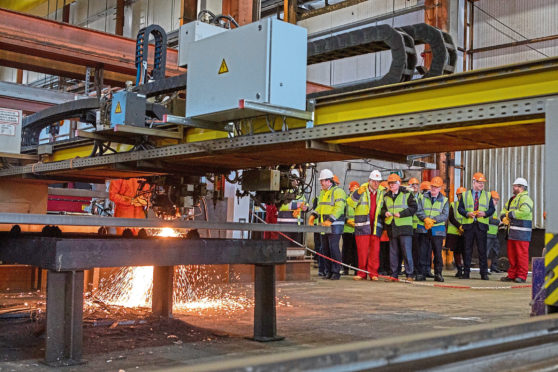BiFab’s Arnish yard was back to work yesterday as first steeel was cut on a £26.5 million offshore piles contract.
Canadian group DF Barnes said its first contract win since it acquired the Fife-based fabricator was an important moment. A total of 82 jobs have been added at Arnish, BiFab’s outpost on the Isle of Lewis.
The contract with GeoSea – which relates to the Moray East Offshore Windfarm – will not create any work in Fife, with BiFab’s Methil and Burntisland yards remaining silent.
However, DF Barnes revealed it was also in discussions regarding potential work on the Neart Na Gaoithe wind farm, one of three major arrays planned for the outer firths of Tay and Forth.
Sean Power, vice president, business development, DF Barnes said: “This announcement is the first stage in a long process that aims to develop and secure a sustainable business.
“We have made a long term commitment to BiFab and are actively leveraging our global skills and expertise to position the company for future growth.”
Energy Minister Paul Wheelhouse said the Arnish contract was a major step forward for BiFab, which was saved from collapse by the Scottish Government in late 2017.
The contract comes ahead of an announcement today of a government-backed Offshore Wind Sector Deal with a central pledge that offshore wind will make up 30% of UK electricity by 2030.
Fabrice Leveque of Scottish Renewables, said: “This sector deal is a major milestone for the UK Government’s Industrial Strategy, setting a clear path for offshore wind: one of ambition, optimism and innovation.
“That’s particularly true in Scotland, where the sector is building out again after delays which meant schemes in shallower waters further south powered ahead.”
ScottishPower has reacted to the deal with a pledge to build more offshore wind capacity.
Chief executive, Keith Anderson, said: “The Offshore Wind Sector Deal will drive the transformation of offshore wind generation, increasing the amount of low-cost, low-carbon generation for the UK and proves that the idea utilities still need to rely on coal and gas is outdated.”
